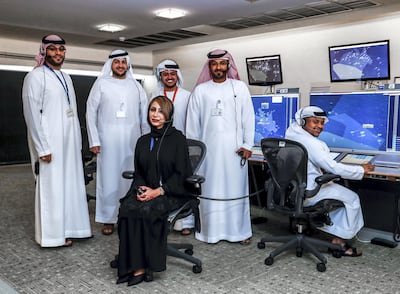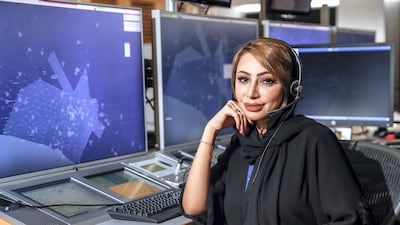In a field that is behind the times when it comes to gender equality, Nouf Al Afifi is a shining example of the role women can play in helping to grow the aviation industry.
Becoming one of the first and only Emirati women air-traffic controllers when she passed the General Civil Aviation Authority's extended training programme in 2011, Ms Al Afifi and has been working at the Sheikh Zayed Air Navigation Centre ever since.
The centre is the busiest and most advanced air traffic control facility in the Middle East. It handles more than 2,200 air traffic movements per day for the eight international airports in the UAE, as well as aircraft crossing UAE air space.
“My passion for aviation started at a very young age and while preparing to interview for the National Cadet Pilot Programme I read about air traffic control, and, I guess, I found my dream job,” said Ms Al Afifi.
But, while the 28-year-old is thriving in a job that’s frequently described as one of the most hectic in aviation, she remains a minority in a field that is still largely dominated by men.

“When I first started training, I faced issues with those who did not want to see women pursue non-traditional and challenging careers,” said Ms Al Afifi, who is now a supervisor at the centre.
“Many pilots, regardless of nationality, were not used to female air-traffic controllers so I had to become stricter and show them that I am able to do my job.
“I worked in an office filled with men and managed to win their respect and appreciation.”
Out of the 130,000 pilots who are employed globally, just 4,000 are women, which means they make up just 3 per cent of the workforce. The board of the International Air Transport Association is also almost exclusively male.
But with the aviation industry suffering a shortage of people entering into training as it continues to see strong growth, schools, such as Sharjah International Airport's Alpha Aviation Academy, are looking to attract more women to fill the shortage.
The Saudi Academy of Civil Aviation is also running a women's air traffic control course as part of a programme to create more jobs for Saudi women.
Part of the problem has been that girls being are fed images of women as cabin crew and men as pilots and controllers. While Ms Al Afifi’s immediate family were supportive of her career choices, some of her friends and relatives said that being an air traffic controller was a job "unfit for women".
"I always reply 'why would any man be a better fit for this job?'" she said.
____________
Read more:
UAE pilot training academy seeks more women to tackle global shortage
Long-haul, low-cost: How new technology is changing air travel forever
Portrait of a Nation: the Dubai adventurer with an unusual approach to achieving world peace
____________
Ms Al Afifi believes hard work is what pays off, regardless of gender.
Her career diligence has seen her promoted to supervisor, and she has obtained a pilot licence from the Emirates flying school and a master’s degree in air safety management from the City, University of London. She is now studying for a second master’s degree in airport management.
And while the job is stressful, it is also rewarding.
Recalling one incident she helped to rectify a couple of years ago, she said: “A pilot informed me that a woman pregnant with twins had gone into labour on board a flight. The plane was thousands of feet above Dubai Airport and had to make an emergency landing as one baby had already been born. We handled the situation and the woman gave birth to her second baby in the airport — both were happy and healthy."
You can't be what you can't see, and with Ms Al Afifi now helping to train new recruits, the hope of a more female future for aviation looks promising.

